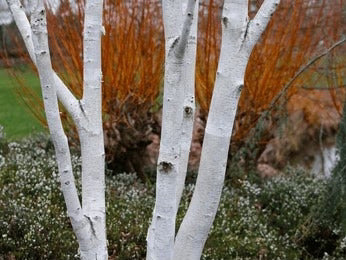The Bhoj Patra Tree is a common tree in the Himalayas that is famous for the usage of its bark, which is described in old Indian textbooks. The tree's white-to-brownish bark serves as an identifying feature. It is a medium-sized tree with very distinct, nearly transparent-thin strips of bark that peel off. Catkins, which hang in groups at the ends of bare branches or with newly emerging leaves, are where male flowers are formed. lone spikes of female flowers appear. The leaves are oblong, sharply pointed, irregularly saw-toothed, and when young, finely hairy. They are 5-8 cm long. blooming: April through May.
The Bhoj Patra tree typically grows to a height of 65 feet.
General Information
There was a time when horoscopes were written on special leaves known as Bhoj patra or Bhurja patra. Until the creation of paper, the bark of Bhoj patra was utilized to store written information.
Chemical Composition
The bark includes an essential oil as well as betulin.
Habitat
Bhojpatra's bark is silky, shiny, and paper-like, and is commonly found in the Himalayan area. It has a crimson and white heartwood. Flowers begin to develop when the tree's leaves begin to emerge. Flowers begin to appear in the summer and mature into fruits in the autumn.
Classification
Name
Ayurvedic Properties
|
Particular |
Hindi / Sanskrit |
English |
|
Rasa (Taste) |
Kshaya |
Astringent |
|
Guna (Physical Property) |
Laghu |
Light |
|
Virya (Potency) |
Ushna |
Hot |
|
Vipaka (Post-Digestive Taste) |
Katu |
Pungent |
Effects on Doshas
It balances the three doshas if they are out of equilibrium.
Medicinal Uses
- Its bark is used in medicine as a powder or decoction.
- Bhoj patra is recommended for local application in skin illnesses and preparation for ear diseases in Charak Samhita. When there is pus in the ear, seeping out of the ear, and deafness, a mixture of bhoj patra and other herbs such as Vidanga, Nagarmotha, and others is recommended.
- Bhoj patra is beneficial in the treatment of epilepsy, insanity, hysteria, and convulsions.
- This plant also reduces the effects of toxins and prevents obesity.
- Bhoj patra relieves nasal bleeding and is beneficial in cases of diarrhea and dysentery.
- The herb possesses the ability to treat wounds. To wash the wounds, Its decoction is employed to clean the ear in cases of earache and leakage. The vapors of bhoj patra aid in placenta expulsion when it is tough.
Practical Uses
- Melanoma - According to recent clinical trials conducted in the United States, the bark of the Himalaya Silver Birch, which includes Betulinic acid, is particularly beneficial in the treatment of Melanoma, a type of skin cancer.
- Kidney - The bark of the tree can also be used to treat renal and bladder problems.
- Anti-Inflammatory - The Himalayan Silver Birch has anti-inflammatory qualities that help to alleviate the pain and inflammation produced by rheumatism and gout. Botulin-containing bark is known to have anti-fertility properties.
- External Application - Birch bark's papery outer layer is regarded as a potent astringent. Its external usage as a styptic (to halt bleeding) and to stop any purulent discharge is advised due to this quality. As a result, it is increasingly frequently used to clean wounds.
- Obesity - Birch is also used in several Ayurvedic formulations for obesity and other lipid metabolism issues. It has been said to be a herb that effectively treats obesity.
Bhoj Patra's uses in a divine way
Bhoj patra bark is used as a covering to shield from the negative effects of demons and other bad entities. Its bark has been used by sages to make their lower clothing. People who are traveling to Gangotri, Badrinath, and Kedarnath tie the tree's bark under their feet to make the trek more comfortable. Due to the fact that Bhoj Patra occurs in that heavenly zone, it is regarded as being extremely auspicious. Its presence is fortunate because no evil spirit will dare to cause mischief when bhoj patra bark is present.
Part Used
Leaves, roots
Dosage
- Decoction - 5 to 10 ml
- Bark Powder - 3 to 6 gm

